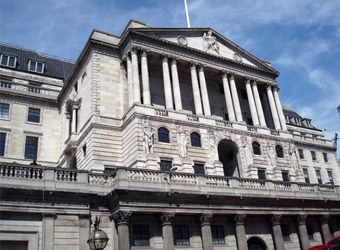Workers at the Bank of England (BOE) walked out Tuesday on strike for the first time in five decades, over a pay dispute.
Employees working in the central bank’s maintenance and security departments, will continue the industrial action over the next three days.
Staff employed in the bank’s “parlors” – ground floor offices where BOE Governor Mark Carney and his senior colleagues work – are also involved in the strike.
A last-minute attempt to halt the action at the government’s conciliation service Acas yesterday failed to break through. The U.K.’s Unite union has been in dispute with the BOE over a below-inflation 1 percent increase in pay for maintenance, parlors and security personnel.
“Mark Carney should come to the picket lines outside this iconic British bank today and explain why hardworking men and women deserve to face years of pay cuts,” Peter Kavanagh, a Unite official, said in a statement on Tuesday.
“They are struggling to pay their bills and feed their families because the bank has unjustly imposed a below inflation or zero pay rise.”
Staff wore Mark Carney masks outside the institution’s headquarters in Threadneedle Street, London.
Pay dispute explained
Unite said the pay dispute relates to an increase in the staff pay pot of 1 percent. This doesn’t necessarily mean all Bank of England staff get a 1 percent raise, but that management can decide who is allocated increased pay from this overall increase. Some staff could be paid more than 1 percent while others could be left without a raise.
Mercedes Sanchez, a Unite representative for workers at the Bank of England, told CNBC that employees were holding the strike due to not being consulted.
“The reason why we are here is because the Bank of England decided to impose our pay at work this year at 1 percent without negotiating with Unite the union,” she said.
“Most importantly, it wasn’t negotiated with the union, so we don’t have the input of our members, the workers of the bank, into how much money they are going to get. And on top of that, they didn’t have an input on how this is going to be distributed.”
She added: “This has resulted in one third of our workers receiving no (increased) pay at work whatsoever, receiving zero. We’re getting to a point where we have an inflation rate at almost 3 percent at the moment – how is that fair?”
The union representative added that the central bank’s status as a respected financial institution meant that she was disappointed in its response during pay negotiations.
“We’re talking about the Bank of England; we think that they should be an example for the financial institutions to follow, and that’s why people are so upset because it is not O.K.”
She said that Mark Carney is “a decision maker,” and as such, he is the person responsible for this strike.”
The last-minute talks failed to materialize on Monday. Unite’s Sanchez said that this was because the union couldn’t accept any counter-offer lower than their proposed pay increase.
“We thought we would be able to get a resolution, the suggestion was faced to Carney, and he rejected it. And we decided that we just couldn’t accept it any lower than we were already proposing, the lowest that our members could actually accept,” Unite’s Sanchez said.
She did not specify how much Unite’s proposed pay increase was.
Sanchez said that the proposal Unite put forward to the bank was to ensure a pay increase next year, that this would be negotiated and agreed with the union and that workers had “an input on how the money is distributed to everyone.”
Another proposal was for workers to be given a day off on both Christmas and New Year’s Eve, Sanchez added.
The central bank maintained that operations at the bank would continue smoothly.
“The Bank (of England) has been informed of industrial action being called by Unite will commence at midnight tonight for three days. The Union balloted approximately 2 percent of the workforce,” a spokesperson for the Bank of England said in an official statement on Monday.
“The Bank has plans in place so that all essential business will continue to operate as normal during this period. The Bank has been in talks with Unite up to and including today and remains ready to continue those talks at any time.”
UK central bank staff not the first to take strike action
Employees at central banks in India and Ireland have also taken part in industrial strike action.
In 2015, a majority of the Reserve Bank of India’s 17,000 employees went on strike, which was described by the central bank as a “mass casual leave”.
Four unions had called for the strike in demand of better pension benefits and opposition to reforms that would reduce the Indian central bank’s regulatory powers.
A year later, mint workers at the Central Bank of Ireland – the people responsible for producing the country’s money – staged a one-day strike in a dispute over pay.
Source: CNBC


